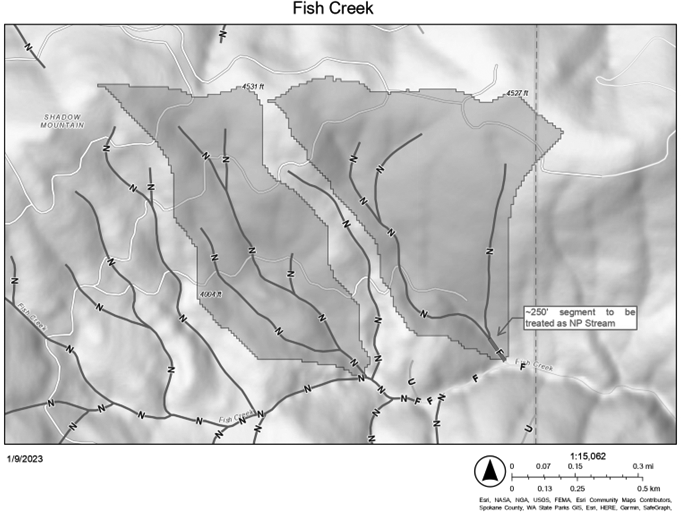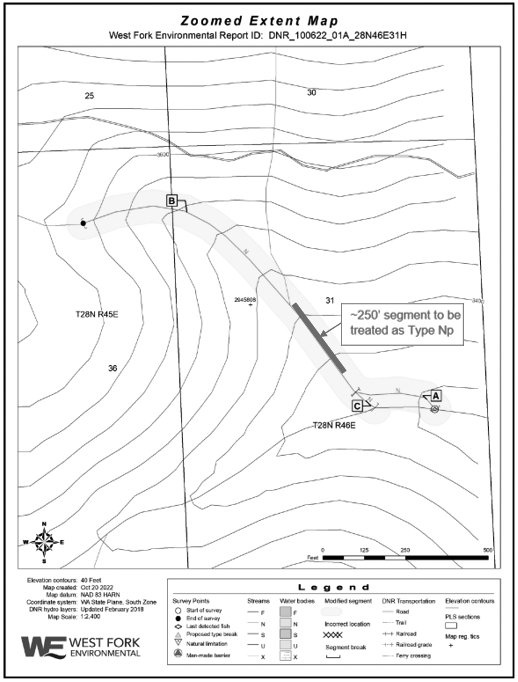WSR 23-05-090
PREPROPOSAL STATEMENT OF INQUIRY
FOREST PRACTICES BOARD
[Filed February 14, 2023, 3:29 p.m.]
Subject of Possible Rule Making: Experimental research treatments.
Statutes Authorizing the Agency to Adopt Rules on this Subject: The forest practices board's authority to adopt forest practices rules is granted under RCW
76.09.040, [76.09].050, and [76.09].370. The pilot project process is authorized by RCW
34.05.313.
Reasons Why Rules on this Subject may be Needed and What They Might Accomplish: This rule is necessary to authorize a single cooperating forest landowner to conduct a harvest within the inner zone of the riparian area buffer of the upper reach of a single fish-bearing stream (Type F) in excess of what is permitted currently in the forest practices rules (WAC 222-30-022(1)). This deviation from the rules is needed to allow the stream to be included in a scientific study. This study is being conducted by the state's formal forest practices board's adaptive management program (AMP) with regulatory oversight by the state department of natural resources. The purpose of this study is to determine the extent to which the prescriptions found in the eastside Type N riparian prescriptions rule group are effectively achieving performance targets, particularly as they apply to sediment and stream temperature and their effects on aquatic life. This pilot rule would apply only to the one landowner for only one ~250' section of Type F stream, identified as necessary by the researchers with the AMP. The upper ~250' of the lowest study stream reach within the harvest basin, that is currently Type F, would be treated as Type Np under this pilot rule for the purposes of this scientific study, to ensure consistent harvest intensity throughout the study basin and across study sites.
Other Federal and State Agencies that Regulate this Subject and the Process Coordinating the Rule with These Agencies: The state forest practices board is the oversight agency with the authority to approve this pilot activity. The pilot rule is being requested as part of the formal state forest practices board's AMP, which includes representatives from state agencies, including the departments of fish and wildlife, ecology, and natural resources; federal agencies, including National Marine Fisheries Service, United States Fish and Wildlife Service, and the Environmental Protection Agency; forest landowners; the environmental community; county governments; and tribal governments.
Process for Developing New Rule: Pilot rule making.
Interested parties can participate in the decision to adopt the new rule and formulation of the proposed rule before publication by contacting Patricia Anderson, Rules Coordinator, Department of Natural Resources, Forest Practices Division, 1111 Washington Street S.E., 3rd Floor, P.O. Box 47012, Olympia, WA 98504-7012, phone 360-902-1400, fax 360-902-1428, email forest.practicesboard@dnr.wa.gov.
Additional comments: The Eastern Washington Type N Riparian Effectiveness Monitoring Project (ENREP) is an active field study being conducted by the state's forest practices AMP. As depicted in red in the figures below, this proposed pilot rule would apply to the upper ~250' of the lowest study stream reach within the harvest basin. This Type F stream segment will be buffered with a Type Np buffer which is a 50' two sided buffer for the 250' stream reach. This rule is needed to allow the implementation of this study to adhere to the research approach described in the study design, which has been approved by the cooperative monitoring, evaluation, and research (CMER) committee. Pilot rules have been used in prior studies developed by CMER to allow cooperating landowners to selectively deviate from specific elements of the rules in order to test rule-alternatives or to ensure consistent harvest intensities across test sites.
Figure 1. Map depicting the 250' segment of stream to be treated as Type Np.
Figure 2. Zoomed extent map. The red line depicts the 250' segment of stream to be treated as Type Np. Note: This map was developed as part of a stream survey, and the labels "A," "B," and "C" are not pertinent to this preproposal statement of inquiry.
February 8, 2023
Alexandra K. Smith
Chair


